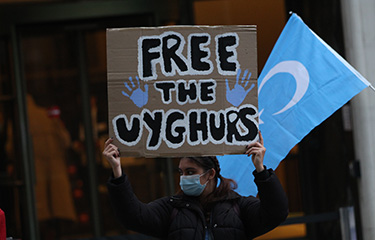Social audits for MSC, ASC, BRC certification likely missed evidence of Uyghur forced labor

A weak social auditing process, including heavy reliance on self-assessments, allowed the presence of Uyghurs in Chinese seafood processing facilities to go undetected by seafood certification nonprofits including the Marine Stewardship Council, the Aquaculture Stewardship Council, and the British Retail Consortium, according to a report from The Outlaw Ocean Project.
The independent journalism group published a report in The New Yorker on 9 October outlining its investigation into the use of state-sponsored forced labor, as defined by the U.S. Uyghur Forced Labor Protection Act of 2021, in 11 Chinese seafood processing plants, most of which carried the joint MSC/ASC chain of custody certification.
Many retailers have enacted their own sourcing requirements that have a social component, typically including language barring the purchase of any item produced with forced labor. Additionally, certification organizations such as the British Retail Consortium Global Standard, the Aquaculture Stewardship Council, the Marine Stewardship Council, and Best Aquaculture Practices contain social components prohibiting the use of forced labor.
The MSC introduced requirements designed to address concerns over the use of forced and child labor into its chain of custody standard in 2019, requiring an independent third-party audit. The audits were required as a means of assessing the level or exposure a company’s supply chain has to risk of labor violations during processing, packing, repacking, and manual loading or offloading of seafood. MSC also introduced a zero-tolerance policy toward forced labor in its latest chain of custody standard, and in August 2018, MSC moved to require companies certified to its fisheries standard to submit a statement declaring they did not employ forced labor or child labor.
The Aquaculture Stewardship Council has adopted MSC’s chain of custody standard rules on forced labor, and its forthcoming farm standard is aligned with ILO Declaration on Fundamental Principles and Rights at Work, which prohibits the use of forced or compulsory labor.
The three Sustainable Supply Chain Initiative-approved audits approved for MSC-ASC chain of custody certification were the Amfori Business Social Compliance Initiative audit; the Sedex Members Ethical Trade Audit (SMETA), or the SA8000 Certification from Social Accountability International. Of the three approved audits, Sedex’s SMETA audit was the most-popular choice of the Chinese processing plants identified as using Uyghur labor.
The Outlaw Ocean Project sought out comment from MSC and ASC regarding the efficacy of these audits …
Photo courtesy of rasid aslim/Shutterstock





Share